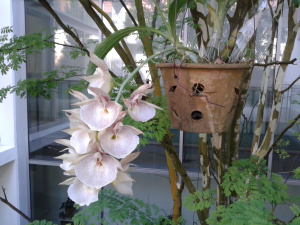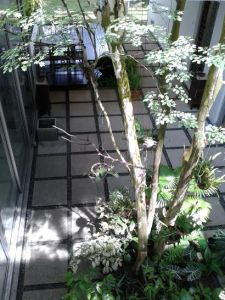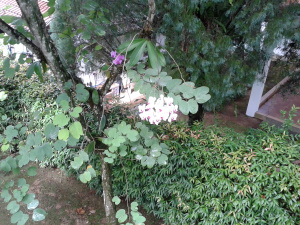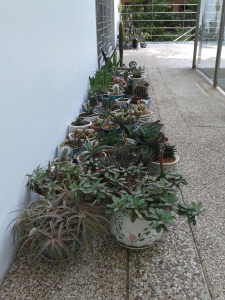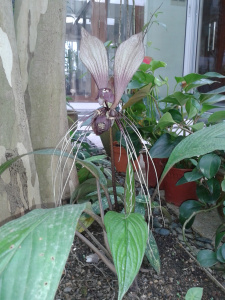Special Focus on Leong Liew Geok
From the archives (June 11, 18, 25, July 2, 9, 16, 23, 30, August 6, 13, 20, 2015):
The intent of Singapore Poetry’s “Special Focus” series is to highlight an important aspect of the work of an established poet of Singapore. This aspect may be a thematic thread, formal preoccupation or recurring image; it will provide a vital way into the poet’s writings. By making available a substantial selection of poems, SP hopes to encourage both readerly and critical immersion in the poet’s body of work. We begin to see connections, reiterations and reformulations that are missed in reading just one poem.
SP is very pleased to begin this series by bringing you the extraordinary gardening poems of Leong Liew Geok. Born in Penang, Malaysia, Leong moved to Singapore in 1981. Thereafter, she published two important collections of poems, Love Is Not Enough (1991) and Women without Men (2000). The gardening poems in her second book represent a signal achievement in Singapore poetry. Alternating between lyrics and dramatic monologues, they are a sustained engagement with the cultivation of both self and environment. The poems will appear on this website, one every Thursday, in the course of the next ten weeks. The series will end with the publication of a new gardening poem by Leong. Photographs taken by the poet provide intimate glimpses of her garden and, by extension, Singapore, the Garden City.
Father’s Orchids
Vandas, spathoglottis, oncidiums, mostly —
Strong, fat, undying. He slapped cowdung,
Misted fungicide, packed coconut husk,
Brick and charcoal when needed. On mornings
When he ladled urine from the earthen jar,
Mixing piss with water, the garden
Stank with the tonic he had mixed
To feed them once or twice a week.
Of all his orchids — and of those that live
Or die on me, I think of Father most
With uncommon Dendrobium anosmum:
Purple-pink; scented petals tapering,
A pair of purple spots deep-staining lip;
They hold for days. My father grew his
On branches of chiku and nona
To breathe, sun and bathe.
Treeless, mine live in a pot hanging
On bonsai copper strung between palms.
Four blooms have opened from one pseudobulb,
A lone fifth from another. I see
How they bloomed for him, at least
Twice in size, on whiter, stronger stems
Than mine. He had a way with his tree-borne
Orchids. I grow to remember, but belittle.
The Gardener Walks to the Bus Stop
What robbery: open space bald with slate,
Without an inch of grass to show for love;
A disaster when stone is overdone.
This one’s better, though its shrubs need
Proper pruning. By their looks, your plants
Need new soil. Idiot, move those ferns
Before they burn. As for that bougainvillea
Hiking up your roof, prune and saw,
Saw and prune. Sack your lazy good-for-nothing
Gardener. Or go climb a ladder yourself.
Look at that heap outside No. 53: Belamcanda, Cereus
Ixora, Ascocenda lumped and in flower together —
More than can be said for 54: their heliconias
Need thinning to flower again.
And the weeds, the weeds are strangling
Your friends, No. 56. Shame on you to call your garden
One. Would you like to be crowded out of turf
By strangers and squatters? Use some elbow grease.
And common sense is free.
Wow! Such healthy Coleus outside 58, and pretty too:
A snap of the top on my way back would be nice
And too good to miss. What a beauty that multi-petalled
Jasmine is! A real pity it’s too far in
For me to be a thief. You don’t deserve a garden;
Yes, No. 62 — I’m telling you to send
Your fans back to Madagascar or Raffles Hotel:
Traveller’s Palms do not a garden make;
You’ll do better with Ptychosperma; under it
Dendrobiums like yours will benefit.
66: do without your bamboo corner
Unless you want suckers inside your kitchen.
Dig them out and plant some shrubs to camouflage
The side where the clothesline juts into — Oh-oh, I see
The bus coming fast —
Gottarunforit —
A Walk in the Japanese Garden, Jurong
Kenshunmon, the Gate, promises paradise in spring:
Thirty-two acres unfurled in landscape with few flowers
Where rocks, trees and water move you to lose the world.
Think of the labour of design:
Five hundred tons of Japanese stone brought,
One thousand eight-hundred tons of local rock,
That they might mingle on land or in water;
The ponds dug, islands shaped, vegetation planted,
Shibusa placed. Casuarinas screen coconut trees
And multistorey flats across the Lake;
Here cicadas call, to distant bulldozers,
And four kinds of bamboo, knobbly to smooth,
Gold to green, grow too thick to ply the breeze.
Pines stand guard near Pong-Pong groves;
A flank of angsanas, across rain trees on the knoll,
Arch airy branches to lead believers on.
In the forest where sages are supposed to flock,
Guava, lime and jackfruit grow! An afterthought,
That native fruit should root surprises too.
Into water-lily depths, a terrapin splash-dives;
Dragonflies skim; dart to hover to dart.
A catfish wriggle stirs clouds of sediment —
The ponds need cleaning after nineteen years —
And bagworm cases cling to lantern rims.
The cascades too are dry, and the waterfall,
Since when has it stopped tumbling from the sacred
Mountain enveloped in swirling purple cloud?
No entourage descends for nuptial shots,
But couples stroll to arbours, to share
Most secret thoughts. In the Arbour of Purity
Which bilingual graffiti inscribes, I catch the distant
Swathe of water-lilies in sunlight; find Cycad Island
Jade intact, as seem islands where heavenly gods reside.
Gardens here work overtime. All things grow,
Shed without a break; no winter pause
For spring’s outburst. Litters of Pong-Pong fruit
like black stone spheres, or thrusting weeds,
Or fallen branches, or leaves unswept,
Point to natures less than perfect.
Where medieval Kyoto settles in Jurong
And kingfishers’ screams could pierce glass,
Should celestial beings, whooping cranes
And moon-summoning bridges be passed with salt?
To bend with paths or circle with the breeze,
Chart ripples of an ochre lake,
Follow stones on a dried stream bed;
To trace vermillion-splotched nishiki-goi,
Watch drizzling water stipple water’s glass —
Is but to feel the pulses of enclaves
In such paradise as this, whose natures
Blend to give the human pause.
Leaving as I came, I walk the Zen Garden of Seiwaen,
Its clipped ixora mounds a still green backdrop
For mountains, valleys, plateaux risen from dry
Stream of gravel on the ground. By silent
Silent self-sufficing rocks, striated in harmonious hues
I pass, clean gravel crunching under shoes.
— August 1992
Shibusa: Japanese word for refinement, elegance and simplicity
nishiki-goi: Japanese carp. Also, “koi”.
Seiwaen: the name given to the Japanese Garden; in Chinese, literally, “Star and Garden”.
The Gardener Talks to Plants
It’s me again —
How’s the soil today? And the air?
Too hot and dry? Nothing to be done
Apart from daily watering till the sky breaks.
It won’t be long before a nice long bath
Arrives. Leaves up, not limp now.
Watch your postures. Take a leaf from cactii —
They stand proud even when sick and dying
Inside. True, they don’t need to drink as much
But they flower more, compared to greedy
Good-for-nothing you. I’m waiting for your
Blooming turn, you barren runts.
As for you, I’ll have to shave your top
To make your sides fill out.
You could all make less work for me
But you don’t. Here’s some bone-meal
For nice fat amaryllis bulbs — I’ve been waiting
For your leaves to die so that I can dig
You up for wintering in the fridge
So you’ll bloom again, for free.
At least you’re into flowers, fair Tibouchina;
Here’s a treat of sheep dung and osmocote
To keep you rich in royal purple.
I suppose I’ll have to feed you too
Although you haven’t stopped sulking
Since you were moved. Forget your former neighbours —
Be grateful, Hibiscus, you haven’t been disowned;
And listen to a final warning: behave — and bloom!
Backyard Azaleas
The azaleas in my backyard,
Imports from China and Holland,
Grow sparing of stem and foliage
And abstemious with blooms.
I think of digging them out
For natives to flower in their shade;
I’ve tried bone-meal, fish, dung,
Pellets for acid-lovers,
Sawdust for water retention
To bring them round to warmer
Ways of giving. They’re unmoved,
Unlike the South American Tabebuia
And the azalea-pink and lavender
Blooms the trees shed by the ton season
By season, along North Buona Vista Road.
I’ll not cop out before I’m through
Turning icy sprays on leathery leaves
At dawn, and packing ice cubes at night
Around, and above roots: I want
A cold shaking of their status quo,
A snapping of recalcitrance
To show and tell — a Singapore spring
Into summer is blooming overdue.
The Gardener’s Had Enough
The watering heads leak,
The sprayer won’t work
And dirt under your nails
Continues to lurk.
Mould on the soil spreads
A smothering grey slime
Waiting to be scraped off;
It won’t be lost in time.
The bonsai needs repotting
So clear are the signs
Of malnutrition —
For fresh soil it pines.
My orchids are clogged
With seeds of palms overhead
While weeds root and overrun
Lawn and flower bed.
No plant respects me
Enough to behave,
My shrubs blindly branching,
Pursuing a shave.
You’ll understand why
After the pots are counted,
They encroach upon me
And make me disgusted.
If you do not stoop,
A torchlight in action,
To kill off the snails,
Morning is destruction.
Cease giving chances,
You’ve nothing to lose —
Throw the unblooming out,
They simply must choose.
Stop buying and adding,
You’ve more than enough
For one jungle-nursery
Stocked with green stuff.
That gardening’s a business
Is matter of fact;
No plant’s irreplaceable,
There’s nothing to regret.
There’s no meeting point
Between the living and dying:
Either you, or your plants expire,
Though you don’t feel like watering.
So be it if dead:
There are fewer to mind
And less work around
Of the backbreaking kind.
No more orchids; no more shrubs.
No more snails or other bugs.
No more jasmine-scented air,
No cacti to stab or dare.
No cause left to grumble,
Mutter about or berate.
Life would be deadly, dire,
With zero to recreate.
Gingko and Bottlebrush
In a ball of Californian soil,
This sapling was a gift, hand-carried
And airborne, its veined, lobed fans a muted
Sheen. Though living in half-shade, the leaves
Dried and curled a papery brown
To fall. The gingko spine clots
At the nodes. Months have passed;
Shock as well. Little knobs of brown
So clenched, wait on their skeletal
Sentinel for spring’s trigger to crack
Buds green — though winter hasn’t been.
Out of its clear and dry habitat,
the bottlebrush grows taller, and languishes
With branch by branch of foliage
For inflorescence, its several flowers
A punctuation for the green prose
Of adoptive land. To see Australian blooms
Brush shrub or tree a great great
Red, spiking the outback green of leaves
With soft stamens, is to know
From the spread red lavishes —
Transplanted callistemon as parenthesis.
The Gardener Returns
The plants from last month’s nursery
Not yet potted, I turn the soil.
It’s better than clearing paper deadlines
That can’t be met. In rainy weather,
The sodden ground makes clutching weeds
Easy victims. And soil that’s thrown
Out clods and stones flows like grain
Through my caked fingers.
As shovel slices through, I dream of this week’s
Nursery, more plants to visit — and pay for —
When earth and deadlines are strewn
With multitudes still untransplanted.
No matter. I squat to shove pens
And papers out for grit in a lover’s hands.
Equatorial
We were born into this:
Clogged pores, clammy limbs,
Sweat which itches and stains
Collars and armpits, souring nostrils.
Wrapped in blanket sheath,
Plants aren’t pierced by ice
And trees don’t save for spring;
A yellow sun burns harder,
Foliage throws a greener rash;
Fruit and flower clash for brightness
And rain’s soap opera, the monsoon,
Drenches us into missing the sun.
Wet or dry, we use walkways, porches,
Umbrellas, trees whose shades —
Probed by tentacles of heat —
We swelter in. Let tourists bake
Themselves on sand. We love our
Air-conditioned places, at least
Till evening draws the sun-shy
And the breeze, if there,
Takes the humid out of circulation.
Through day, by night, the nature
In which termites breed unseen
And appetites cease only for death
Takes no rest: the equatorial floods
Profligate air, saturating.
The Gardener Gets High
Hispid thumbs and fingers,
Or knuckled fists for leaves;
One glance at spines teeming
And you’d think thrice to touch
Rosettes with spikes, tufted glochids;
Barbs, areoled ribs. Sunseekers
Like these find thirst selfish,
Rude. They’d rot from overwatering.
In orange, lemon, cherry or pink,
their blooms stun with stuck-on looks.
How hoary! hispidilous! hirsute!
An enclave — one hundred pots
Sitting in my garden, courting
Tropic greenness with phallic deserts.
Reprinted here with the kind permissions of author and Marshall Cavendish International (Asia) Pte Ltd, the poems "Father's Orchids," "The Gardener Walks to the Bus Stop," "A Walk in the Japanese Garden, Jurong," "The Garderner Talks to Plants," "Backyard Azaleas," "The Gardener's Had Enough," "Gingko and Bottlebrush," "The Gardener Returns," "Equatorial," and “The Gardener Gets High” first appeared in Women without Men (Times Books International, 2000).
The Gardener’s Alphabet
A is for aphids, all creamy inside,
B is the bamboo, which roots far and wide.
C is for compost, loosening the soil,
D for the dragon scales clawing brick wall.
E is the earthworm, secret aerator,
F is food for plant health : fertilizer;
G’s for green fingers and groundcover to boot,
H is Heliconia, each sucker a shoot.
I is for insects, as well as insecticide,
J, the jasmine, fragrant and white.
K is for Kopsia, native to this region,
L is the lallang, whose toughness is legion.
M is methylated spirit, for mites, scales and mould,
N is carnivorous Nepenthes, from jungles of our world.
O is for orchids, loved for lasting power,
P is the pruning, so shrubs keep shapely order.
Q is Quisqualis, budding out from its trellis,
R is for roses and rhododendrons, stifled by the tropics.
S is the snail, object of enmity,
T is Tacca, its dark whiskered blooms a curiosity.
U is Umbrella sedge, a papyrus relative,
V is for vines, camouflaging the sensitive.
W is for weeds: recurrent, obnoxious, rampant,
X, Xanthostemon, blooms overwhelmed with stamens;
Y is Yucca, panicles held high, not low,
Z is flowerless Zamia, just leathery leaves to show.
Born in Penang, Malaysia, Leong Liew Geok has lived in Singapore since 1981. She is the author of Love is Not Enough (1991) and Women without Men (2000). She edited More than Half the Sky: Creative Writings by Thirty Singaporean Women (1998; repr. 2009 ) and Literary Singapore: A directory of contemporary writing in Singapore (2011) for the National Arts Council. She taught at the Department of English Language and Literature, National University of Singapore from 1981-2002. More recently, her poems have appeared online in Softblow Poetry Journal and Blue Lyra Review. She is (still!) working on her third collection of poems, envisaged for publication in 2016.

